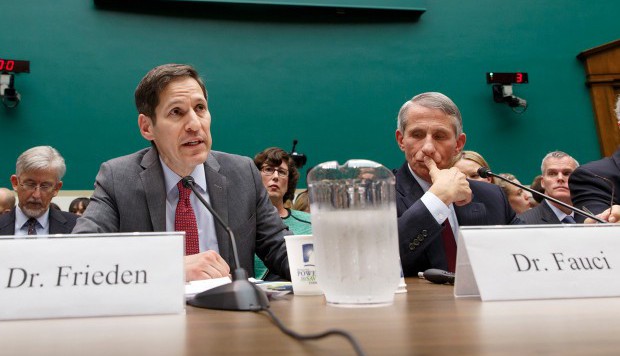
Top U.S. health officials Dr. Tom Frieden (left) and Dr. Anthony Fauci (right) rejected lawmakers’ calls for a travel ban, once again explaining that restricting travel would actually make it harder to control the outbreak.
Growing numbers of conservative U.S. lawmakers on Thursday called for a ban on travel from the West African nations at the center of the Ebola epidemic, spurning the advice of the nation’s top health officials who testified that such an action would be counterproductive.
Cries to cut off travel from the affected nations escalated dramatically with the arrival in Texas of Thomas Eric Duncan, who contracted the disease in Liberia and became sick after he arrived in the United States, and whose infection has spread to two nurses who cared for him.
At least 40 members of Congress have gone on record seeking a travel ban, and several pressed the case for one in a hearing on Capitol Hill.
“It needs to be solved in Africa, but until then, we should not be letting these people in, period,” said Rep. Fred Upton (R-Mich.), the chairman of the Energy and Commerce Committee, which held the hearing.
“I restate my ongoing concern that administration officials still refuse to consider any travel restrictions for the more than 1,000 travelers entering the United States each week from Ebola hot zones,” said Rep. Tim Murphy (R-Pa.), who heads the subcommittee on oversight and investigations and led the hearing.
“A month ago the president told us someone reaching our shores with Ebola was unlikely, and that we’ve taken the necessary precautions to increase screening at airports so that someone with the virus does not get on a plane to the United States,” Murphy said. “Screening and self-reporting have been a demonstrated failure.”
Counterproductive effects of travel bans
Dr. Thomas Frieden, the head of the Centers for Disease Control and Prevention, had testified to Congress earlier in the outbreak that it was possible someone could arrive in the United States and become sick with Ebola. He said, however, that the disease could be controlled in the U.S. through effective contact tracing.
While Dr. Frieden did not rule out a travel ban, he and Dr. Anthony Fauci, the director of National Institute of Allergy and Infectious Diseases at the National Institutes of Health, explained once again why it isn’t a good idea.
“It is understandable how someone might come to the conclusion that the best approach would be to just seal off the border from those countries,” Dr. Fauci said. “But we are dealing with something now that we know what we are dealing with,” he said, answering Rep. Henry Waxma (D-Calif.), who had just held up a map showing numerous flight paths a person could take from West Africa that stopped in multiple other parts of the world first.
“If you have the possibility of doing all of those lines that [Waxman] showed, that is a big web of things where we do not know what we are dealing with,” Dr. Fauci said.
Under the current system, authorities flag anyone who has been in any of the affected countries in the previous 21 days, which covers the incubation period for Ebola.
John Wagner, a Customs and Border Protection official, said that since screening had started in U.S. airports, some 155 people had been flagged for extra screening, with a number of them getting second and third looks. None have had Ebola.
The idea, Dr. Frieden and the others explained, is that in order to effectively stop Ebola from spreading, medical authorities have to be able to trace back a person’s movements and contacts. That becomes difficult if people are hiding their movements to circumvent the ban, making it much more likely that other people can become infected unknowingly.
Wagner said it would be possible to track people who did not tell the truth, but that having a travel ban raises the odds of infected people slipping through.
The doctors have also warned that cutting off travel to the region could make it harder to move medical workers and relief supplies to and from the area, exacerbating the outbreak and creating an even larger pool of infected people capable of spreading the virus internationally.
Politicizing Ebola
Still, members of Congress did not believe the experts, and suggested maybe Congress should take matters into its own hands (because we all know Congress is so great at getting things done…).
“Perhaps this committee should consider forwarding to the full House a request that we have a vote on travel restrictions, because people are asking us to do that, and I think they are exactly correct to make that request,” said Rep. Michael Burgess (R-Texas).
“After having this subcommittee hearing I believe even more that we ought to have them [travel restrictions],” said Rep. Renee Ellmers (R-N.C.).
Another lawmaker who disagreed with Dr. Frieden also suggested that pets should be blocked from traveling, too, noting that a dog belonging to one of the infected nurses was being monitored.
“Although we have not seen transmission of humans to dogs, we really don’t know if there can be,” said Rep. Morgan Griffith (R-Va.). “I understand the concerns about humanitarianism, et cetera, but don’t you think we should at least restrict travel on dogs?”
And that, my dear readers, is why Washington can’t have nice things.

Just saying…
